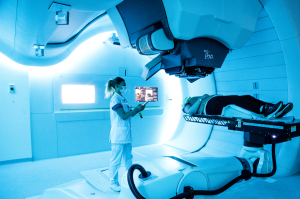IBA partners with Belgian researchers to investigate normal tissue toxicity reduction with FLASH proton therapy
by
John R. Fischer, Senior Reporter | June 20, 2023

ProteusOne (Photo courtesy of UZ Leuven)
Researchers at the Particle Therapy Interuniversity Centre Leuven (PARTICLE), on the UZ Leuven health sciences campus in Belgium and IBA are investigating the ability of FLASH therapy to reduce normal tissue toxicity in a preclinical trial that will be the first performed with a ProteusONE proton therapy system in a clinical setting.
FLASH therapy delivers radiation at ultra-high dose rates (> 40 Gy/s), in smaller amounts, in one to five fractions, instead of the conventional 25 to 30 fractions, potentially reducing exposure to normal tissues, while precisely targeting tumors.
PARTICLE is a project designed by UZ Leuven, KU Leuven, and UCLouvain centered around the development of proton therapy. Using IBA’s single-room ProteusOne proton therapy system, scientists at all three will investigate the potential of ConformalFlash technology, which combines ultra-high dose rates with the Bragg Peak properties of protons, for reducing tissue toxicity. The Bragg Peak effect plots energy loss from ionizing radiation as it travels through matter, occurring immediately before the protons come to rest.
For the project, IBA will enable the FLASH configuration in PARTICLE’s ProteusOne system, which has a superconducting synchrocyclotron. The researchers believe that this component may help avoid contradictory results seen in past FLASH therapy trials.
“Most of the experiments done so far were executed using a quasi-continuous proton beam, while a common characteristic of successful FLASH radiotherapy experiments with electrons is the micro-macro pulsed beam structure. This particular delivery time structure is offered by the superconducting synchrocyclotron of the ProteusONE system from IBA,” Professor Edmond Sterpin, research professor at KU Leuven & UCLouvain, told HCB News.
ProteusOne also has pencil beam scanning to reduce exposure, as well as embedded X-ray and CBCT imaging at isocenter. The study will focus on the sparing effects of proton FLASH on the gastrointestinal tract. Should the results be positive, the researchers will then study its application on tumors in mice.
“If FLASH protects normal tissues but does not protect the tumor, a Phase I clinical trial in humans can be envisaged,” said Prof. dr. Karin Haustermans, medical director of PARTICLE, told HCB News.
IBA started the ConformalFLASH Alliance in 2022 to foster research collaborations around the technique.
|
|
|
You Must Be Logged In To Post A Comment
|

Joern Meissner
First?
June 21, 2023 02:35
I believe "[...] first performed with a proton therapy system in a clinical setting" is misleading. Clearly the setup here seems to be different than the FAST-01 and FAST-02 clinical trials at Cincinnati. How about the R&D work at UPenn and New York Proton Center, just to name 2 institutes? I would call also that R&D in clinical setting.
to rate and post a comment